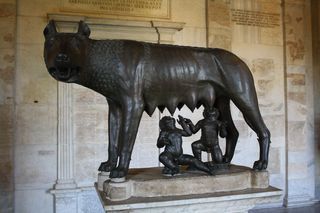A revision course in Livy
I think I have already said that my next book (the one that I am working on nowm not the one just about to appear) is a History of Rome -- from Romulus to Caracalla (reasons for end point will be revealed in due course). It is primarily meant for a general intelligent audience, and the register I am trying to hit is the one I struck in Pompeii. That is to say: I'm not assuming that the reader knows a lot about ancient Rome, certainly not the technicalities, but I am not assuming that they are stupid either or that they want to be given a "baby version" with the problems and big questions skated over.
The point about Roman history (as with the archaeology of Pompeii) is that "how we know what we know" can be almost as interesting (sometimes as interesting) as what we know. On the other hand, readers dont want a book which adds up to little more than a series of laments about how inadequate the evidence is (you cant believe Livy, the archaeology is misleading, etc etc, over and over again). The knack seems to me (and I hope I have got it) to find the right questions to ask of the material we do have, There is a hell of a lot of surviving evidence for ancient Rome. It is only inadequate if you ask it the wrong question.
Take the stories of Rome's foundation, Romulus and Remus inter alia.
There is very little benefit at all in trying to work out which bits of the ancient narratve history of the earliest phases of Rome might reflect historical reality. All those that survive were written well over half a millennium after the supposed events concerned, drawing on lost sources written about half a millennium. It is absolutely clear that some of the story is fantasy/myth (the suckling of the babies by the wolf, for example; some Romans themselves saw that couldnt be factually accurate and pointed out that lupa meant both wolf and prostitute -- the twins had actually been found by a prostitute). It is also quite likely that there are a few traces in the accounts of some aspects that may go back, albeit indirectly, to the very earliest period. The trouble is that we dont have any reliable criteria at all for sorting the wheat from the chaff. Most historians simply cherry pick the "facts" that suit their argument.
On the other hand, if you read the extensive foundation stories that we have (Livy's first book, 4 books of Dionysius of Halicarnassus etc ), you get a wonderfully rich view of how Rome had come to see itself, and debate its own position by the first century BC. The very "fact" that Romulus killed Remus seemed to write fratricide and civil war into Roman identity from the start (continued according to the "myth" by the idea that Romulus' death was not necessarily natural, nor some form of apotheosis; some said he was hacked to death by the senators). And the notion that Romulus first acquired a population for his new city by declaring an asylum, and inviting the runaways and criminals from Italy to join his settlement, chimes loudly with Rome's historical approach to migration and the extension of citizenship.
But the foundation stories (which are almost always retrospective creations anyway, in any culture) are the easy bit. I am now trying to get to feel a bit more comfortable with the "history" of the early Republic, and its rather ambivalent heroes (Camillus and Cincinnatus and co). It's not a period that I have taught for years and years. So I am sitting down with my Livy and reading it quite carefully (flitting a bit between the Latin and the translation I confess).
Going back to it after so long (and reading at a bit of a pace) , I must say that Livy seems sharper and wittier than I recall. Over the last few years, I have got rather stuck in all the cruces and puzzles (like on the impenetrable discussion on the origin of Roman theatrical performance in Book 7), to the exclusion of all else.
My favourite bit so far? It's when he writes (also in Book 7 I think) "I expect readers might have got a bit bored by now with all these wars against the Volsci"! Well, yes and no.
Mary Beard's Blog
- Mary Beard's profile
- 4110 followers




